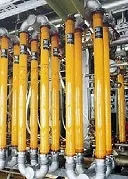
The industrial application of biotechnological processes for the production of chemicals is particularly interesting due to the high specificity of enzymes. Acetic acid bacteria such as Gluconobacter oxydans are already used industrially for regio- and stereospecific oxidations with membrane-bound dehydrogenases. Compared to intracellular enzymes, this has the advantage that substrate and product do not have to be transported through the cell wall.
The Chair of Microbiology at the Technical University of Munich (Prof. Liebl) has succeeded in selectively eliminating the large number of membrane-bound dehydrogenases in Gluconobacter oxydans and is working on introducing special membrane-bound dehydrogenases optimized for specific oxidations, so that only the enzymes required for the intended conversion are present in the cell membrane. This will enable higher product yields and conversion rates.
This will be investigated using the example of biocatalytic oxidations of polysaccharide degradation products from plant residues such as cellobiose (monomer of cellulose) or galacturonic acid (monomer of pectin) to cellobionic acid or, respectively, galactaric acid with recombinant Gluconobacter oxydans. These functionalized polyalcohols could be used for a variety of applications in the pharmaceutical, cosmetics, food and chemical industries.
Subject of this research project will be the reaction engineering analysis of the provided recombinant Gluconobacter oxydans strains under defined conditions in stirred-tank reactors. For comparative characterization, automated parallel bioreactors on a milliliter scale will also be used. Based on the reaction kinetic data, efficient biocatalytic processes in the stirred-tank reactor will be designed. In addition, these data will also form the basis for a model-based design of optimal oxidation processes in scalable membrane bioreactors.
These studies are financially supported by the German Federal Ministry of Food and Agriculture (BMEL) as part of the PolyBioOx joint project.
Publications
- Bieringer E, Pütthoff L, Zimmermann A, de Souza Goés M, Yilmaz U, Ehrenreich A, Liebl W, Weuster-Botz D (2024): Efficient bio-oxidation of cellobiose with engineered Gluconobacter oxydans to provide highly concentrated cellobionic acid. Processes 12: 1464.
- Bieringer E, Garcia Vazquez U, Klein L, Bravo NM, Tobler M, Weuster-Botz D (2023): Bioproduction and applications of aldobionic acids with a focus on maltobionic acid and cellobionic acid. Bioproc Biosyst Eng 46: 921–940.